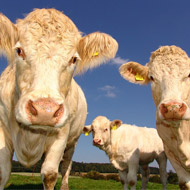
Ministers consult on plans to extend badger cull
Over half of England could receive Official TB-Free (OTB) Status next year, marking a significant step in the Government’s strategy to eradicate the disease.
Ministers say that England is set to apply for OTF status in 2017 - two years ahead of schedule - for the low risk areas of north and east England.
If successful, it would be the first time anywhere in England has enjoyed the status, bringing about trade opportunities and reducing TB-testing costs for farmers.
“Gaining global recognition that more than half of England is TB-free will be a significant milestone in our long-term plan to eradicate this devastating disease, and will open up new trading opportunities for farmers,” explained environment secretary Andrea Leadsom.
“We have much still to do in the worst affected parts of the country, but this shows that our strategy - combining practical biosecurity measures, a robust cattle movement and testing regime, and badger control in areas where the disease is rife - is right and is working.”
Figures published on Friday (16 December) show that more than 10,000 badgers have been culled so far in efforts to prevent the spread of TB. Ministers have described the outcome as a success and are now consulting on plans to extend the cull beyond the planned four years.
Other measures announced as part of the government’s 25-years strategy include:
- Wider use of blood tests alongside the current skin test in the high risk area to provide a more sensitive testing regime in TB affected herds, minimising the risk of leaving infected animals in herds
- A plan to introduce new, more coherent powers to manage the TB risk in pigs, sheep, goats, deer and camelids, to bring them more in line with cattle controls. This will include new statutory compensation arrangements for these species
- More frequent updates to the ibTB online tool which allows farmers to view TB outbreaks close to their farm. From early in 2017 the data will be refreshed every fortnight rather than every month.
Commenting, chief veterinary offer Nigel Gibbens said: “This year we have seen that badger control can be delivered successfully on a wider scale.
“Further expansion in the coming years, alongside our robust cattle movement and testing regime, will allow us to achieve and maintain long term reductions in the level of TB across the South West and Midlands where the disease is currently widespread.”



 The Veterinary Medicines Directorate (VMD) is inviting applications from veterinary students to attend a one-week extramural studies (EMS) placement in July 2026.
The Veterinary Medicines Directorate (VMD) is inviting applications from veterinary students to attend a one-week extramural studies (EMS) placement in July 2026.